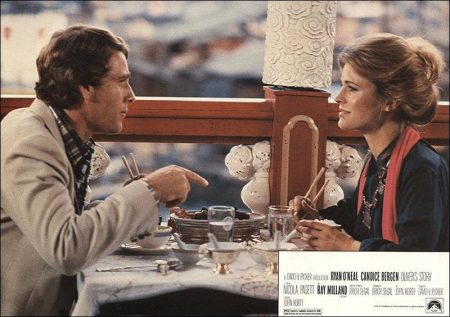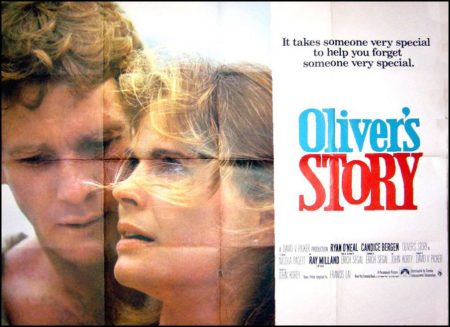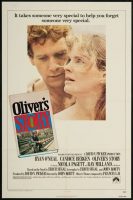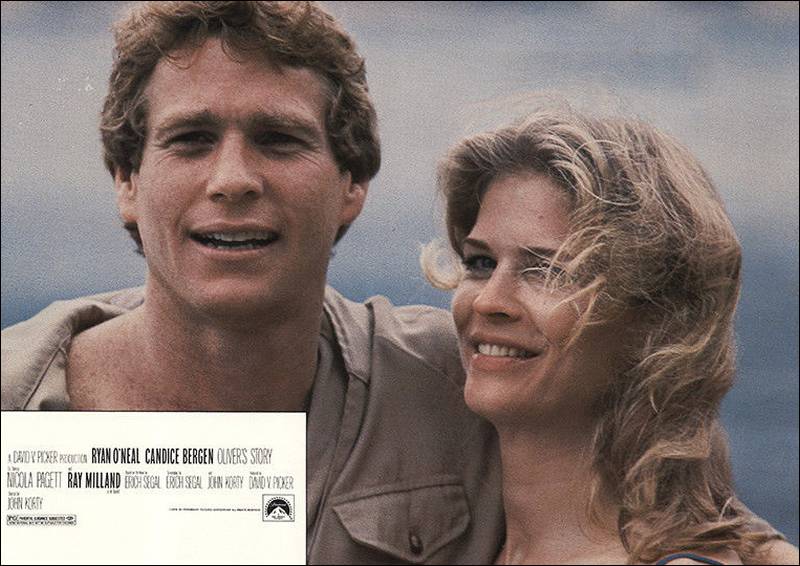Taglines: It takes someone very special to help you forget someone very special.
Oliver’s Story movie storyline. It’s been eighteen months since lawyer Oliver Barrett IV’s wife, Jenny Barrett née Cavilleri, his college sweetheart and the love of his life, died at age twenty-five from leukemia. To cope, Oliver has immersed himself in work, especially in a pet project to assist low income tenants in a lower east side Manhattan housing project take control of the building’s renovation by investing their “sweat” as equity, but has otherwise retreated from the world.
Those that love him, including Jenny’s father, Phil Cavilleri, want him to move on emotionally from Jenny’s death to be able to open himself up to love again. A secret set-up by some friends shows Oliver that he at least has to address his emotional distress by regular therapy sessions. In doing so, he is able to approach a woman to who he is attracted, divorced Marcie Nash, an employee at upscale Bonwit Teller. Both Oliver and Marcie are cautious in opening up fully about their lives, Oliver about Jenny, and Marcie about the fact that she works professionally under her maiden name “Bonwit”, her current role in the company not as an “employee” per se, but being a Board member.
These issues may place hurdles in their relationship in the memory of Jenny coloring how he deals with Marcie as a girlfriend, and their similar socio-economic background – as opposed to Jenny who came from a working class background – placing certain expectations, at least on her part, in the relationship. In this relationship, Oliver may also get a better understanding of what has always been his stiff and strained relationship with his father, Oliver Barrett III, on the eve of his retirement from the family’s textile business.
Oliver’s Story is a 1978 American romantic drama film and a sequel to Love Story (1970) based on a novel by Erich Segal published a year earlier. It was directed by John Korty and again starred Ryan O’Neal, this time opposite Candice Bergen. The original music score was composed by Lee Holdridge and Francis Lai. It was released by Paramount Pictures on December 15, 1978. This film’s promotional tagline is: “It takes someone very special to help you forget someone very special.”
Film Review for Oliver’s Story
Who can forget about a 25-year-old girl who died? Not Oliver Barrett 4th, that’s for sure. At the beginning of “Oliver’s Story,” which opens today at Loews State, the Trans-Lux East and Walter Reade 34th Street East, Oliver is sitting in a graveyard mourning his lost Jenny; at the end of the film, he’s sitting by the banks of the Charles River doing much the same thing.
The ads for “Oliver’s Story” feature a prettily windswept photo of Ryan O’Neal (as Oliver) and Candice Bergen (as Marcie, the new woman in his life), plus the slogan “It takes someone very special to help you forget someone very special.” But if you imagine that that indicates the film is about Oliver’s falling for Marcie and starting life anew, well, you probably think love means never having to say you’re sorry.
In fact, the message of “Oliver’s Story” is a decidedly gloomy one: You get just one shot at young love, and after that you’re over the hill. The happy-go-lucky Oliver of “Love Story” is gone, replaced by a prematurely middle-aged fellow who grinds away at his job, worries about his family responsibilities and spends some excruciatingly dull sessions with his psychotherapist. (“Nothing happens magically, Oliver,” the doctor says on a particularly dreary day. “But just being aware of a problem is beginning to solve it.”)
When Oliver and Marcie take a whirlwind tour of Hong Kong, they’re actually there on a business trip and hardly even enjoying themselves. Over dinner they talk about where they first learned to use chopsticks and how many rolls of film Oliver has used up while touring the city.At least “Love Story” had a romantic and moderately rebellious world-view, being opposed to parental authority and in favor of angels in the snow. “Oliver’s Story” is stodgy through and through, with a hero and heroine who have one good time together jogging through Central Park and never again match the thrill of that moment. Perhaps their detachment and their weary soul-searching and their willingness to get up at 6 A.M. for a good game of tennis are signs of the times. That doesn’t make their saga the stuff of which dreams are made.
The screenplay manages to take every possible edge off Erich Segal’s novel, even though finding the edges can’t have been easy. As written by Mr. Segal and John Korty, who directed it, the script teams Oliver with a WASP department-store heiress whose take-charge attitude eventually gets on his nerves.In Mr. Segal’s book, this was supposed to contrast sharply with the memory of Jenny, with her unaffected, lower-class ways, and to remind Oliver of his aristocratic parents, whom he never much liked.
In the film, Miss Bergen is only a slight departure from Ali MacGraw, who never seemed all that economically deprived in the first place, so the point is lost. A scene of Mr. Segal’s, in which Marcie met Oliver’s parents and — unlike Jenny — was a big hit, has been dropped from the movie, as has every other useful parallel with “Love Story.”In fact, all that remains of the first film are Francis Lai’s theme song and a little photo of Miss MacGraw on Mr. O’Neal’s nighttable, right next to the Excedrin.
This is not to suggest that Mr. Korty has moved on in any imaginative way, or that he is above falling back on “Love Story” every time new inspiration eludes him. After Oliver has a fight with Marcie, for instance, Mr. Korty has him drive all the way to Cambridge, just so he can trot briefly and wordlessly past the other film’s Harvard Yard settings.Jenny’s father is still around (this time played by Edward Binns instead of John Marley), but he has conveniently forgotten all about his daughter and keeps urging Oliver to go out and have a good time. The Barrett parental estate serves a similarly perfunctory purpose.
These evocations are so cold and clumsy that they effectively dispel all vestiges of the first film’s highly marketable mood.Mr. Korty has the reputation of a fine independent film maker; his documentary about the DeBolt family, to be shown on television this weekend, won an Academy Award last year. But his direction of “Oliver’s Story” is too unsure one moment, too insistent the next, and he has no eye for the glamour that might have been this film’s last chance.
Mr. O’Neal is certainly equal to the material, but Mr. Korty doesn’t seem to trust him with it; too many montages seem devised to keep the actor from having to talk. Miss Bergen always looks spectacular in close-ups, so why, then, are there so many unflattering long shots of her in unbecoming costumes? And what use has been made of the (highly exploitable) memory of Jenny? The first sequence shows Mr. O’Neal watching her coffin being lowered into the ground, inch by tearjerking inch. But after that, for all his funk, he doesn’t often think of her again. Perhaps it’s just as well. This is the kind of sequel that could have her turning over in her grave.”Oliver’s Story” is rated PG (“Parental Guidance Suggested”), because it contains one brief bedroom scene and because Marcie has inherited much of Jenny’s smart-alecky vocabulary.
Oliver’s Story (1978)
Directed by: John Korty
Starring: Ryan O’Neal, Candice Bergen, Nicola Pagett, Edward Binns, Benson Fong, Charles Haid, Ray Milland, Swoosie Kurtz, Meg Mundy, Beatrice Winde, Sol Schwade, Frank Toste, Kenneth McMillan
Screenplay by: Erich Segal, John Korty
Cinematography by: Arthur J. Ornitz
Film Editing by: Stuart H. Pappé
Costume Design by: Peggy Farrell
Set Decoration by: Philip Smith
Art Direction by: Robert Gundlach
Music by: Lee Holdridge
MPAA Rating: None.
Distributed by: Paramount Pictures
Release Date: December 15, 1978
Views: 294











